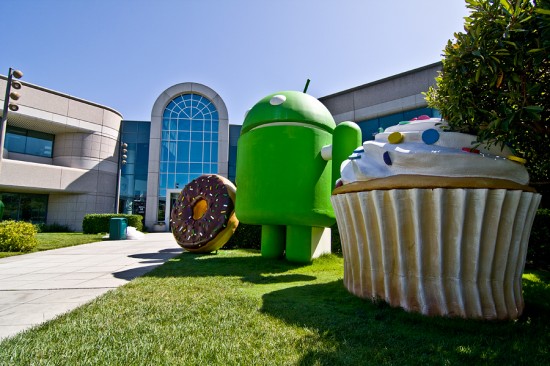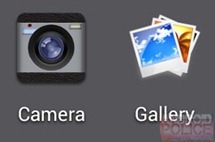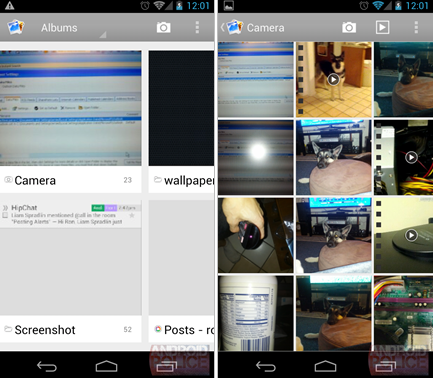Android Phone Fans |
- Android Overload: T-Mobile ends 200 MB plan, Apple vs Samsung, Nexus 10 rumors and more
- Android 4.2 system dump unveils proof of multiple user accounts
- Nexus 7 starts bringing its game on with a 32 GB version
- LG QSlide vs. Samsung Pop-up Play
- Will ISIS bring Google Wallet down? [Poll]
| Android Overload: T-Mobile ends 200 MB plan, Apple vs Samsung, Nexus 10 rumors and more Posted: 20 Oct 2012 05:27 PM PDT
|
| Android 4.2 system dump unveils proof of multiple user accounts Posted: 20 Oct 2012 04:00 PM PDT
A leaked system dump has been revealing multiple improvements Google is said to bring forth with the announcement of Android’s new OS version. This is Android 4.2, which is expected to be a small improvement over Jelly Bean, and will keep said moniker. Among other things, the most exciting new features include a secondary quick settings section in the notification bar and the newly discovered multiple user account system. Now, we are not sure if this feature will definitely come with Android 4.2, but there are some clues in the code that seem to suggest so. If multiple user accounts don’t come with Android 4.2, we can at least be sure that it is in the works. There are some extra code strings that suggest there are additional features in the settings. One would be allowed to manage accounts (create, delete-modify, etc.) and each account would be labeled with a user name and photo. The code also displays signs of parental control settings, which would be able to be edited to accomodate each account and its user. There is no proof, but we can speculate that there will be some form of log-in system that can be accessed via the screen lock. It would be especially nifty if Google could incorporate Face Unlock to the log-in interface. Users could then simply log into their own accounts more easily, without the need of passwords or patterns. Android users have been praying and begging for multiple user accounts for a while now. Especially since tablets started becoming more popular as a family unit. It might be a bit complicated, but we can hope this feature is well-implemented when/if it is released. Ideally, it should be able to save different passwords for social networks, e-mail and other apps. Preferably different Google accounts, as well. Much like a computer.
Generally, it looks great. It does seem a bit wonky in some areas, like the album section, but this is probably not final software. We will just have to wait until the 29th and see! Are you guys ready for a new Nexus and Android version? We are, so stay tuned. [Via: Android Police] |
| Nexus 7 starts bringing its game on with a 32 GB version Posted: 20 Oct 2012 03:00 PM PDT
Regardless, both The Verge and our friends from Droid-Life have gotten pictures of receipts from customers who have managed to purchase a 32 GB Nexus 7 from Staples.   According to the evidence, the 32 GB Nexus tablet will be sold for the same price of the current 16 GB model – $250. The main concern by now is what will happen with the current Nexus 7 versions. We have heard that the 16 GB version will be discontinued, but that would create a huge gap between the remaining 8 GB and 32 GB models. It makes more sense to follow the latest rumors, which state that the 8 GB Nexus 7 will be the discontinued device and the 16 GB model will see a price drop to $200. We can definitely expect to see more information about the new prices and models come October 29 at Google’s New York event.
Needless to say hard-core Android gamers have been gravitating towards other tablets with more storage capacity and external memory options. With this move, Google breaks down its only wall and provides a much more reasonable option for gamers, all while keeping the price more than accessible. I haven’t purchased a Nexus 7 for this reason alone. I am a huge fan of streaming and cloud services, and use them every day, but that simply doesn’t work for gaming. Us gamers need that space to… store our games. I know I am signing up for the 32 GB version as soon as possible. Hell, I am going to give my local Staples a try later tonight and see if they bite – how about you? Images Via: The Verge, Droid-Life] |
| LG QSlide vs. Samsung Pop-up Play Posted: 20 Oct 2012 02:14 PM PDT
Now we have LG’s new QSlide feature, though. It is a direct competitor, as it accomplishes the same but in a very different way. Instead of displaying a hovering video, it creates a form of layer above the whole screen. One can change the transparency of the video to be able to see the background more (or less) clearly while multitasking. Both QSlide and Pop-up Play are good in their own ways, but we must all have a favorite, right? LG QSlideQSlide comes with the brand new LG Optimus G, one of the most talked-about devices during the second half of 2012. Part of this is because it is a great device on its own merits, but it is also rumored that a variant of the Optimus G will be the upcoming Nexus. We love Nexus phones, but sometimes manufacturer UIs can bring features that are very helpful. QSlide is a great example of this; it allows you to watch a video while using other apps. This is accomplished by creating a layer over the screen, which displays the video. One can then change the transparency of the video at will.
Of course, the feature has its defects. One can only use this feature with videos that are locally stored in the device. The Youtube app videos won’t work with it; nor will Netflix or any other videos, for that matter. The video has to be downloaded and played with the stock video player. LG does have another little feature that might be helpful, though. QuickMemo (which you can see in our hands-on video) allows you to accomplish the same, but with writing instead. You can check it out in my hands-on video below. Samsung Pop-up PlayPop-up Play was one of the main highlights of the Samsung Galaxy S3′s features. It keeps making appearances at Galaxy S3 commercials and has been very fun to use for all those lucky Galaxy S3 users. The feature is simple, press the Pop-up Play button while watching a video and it will start playing it in a little square that hovers over the rest of the user interface. The floating video can then be resized by using pinch-to-zoom and it can be moved by simply dragging it across the screen. Just like its competitor, the Samsung Galaxy S3 feature is very limited to the video apps it can use. Picture-in-picture should be much more flexible by now, and this is something both devices lack. It may not be their fault, though, as Google and other developers would probably have to do something to their apps to be able to work with Pop-up Play or QSlide. Verdict: The Third ContenderIf I had to choose between the two, I would say LG’s QSlide function is better. This is a very subjective topic, though, so your opinion may differ. I like QSlide because I feel like it is less obtrusive. Samsung’s Pop-up video usually gets in the way of doing other things, and I find myself moving it around and resizing it much more than I would prefer to. After using QSlide for a while, I have grown to love the fact I can just make the video more transparent and go about doing my regular duties. If something cool is happening, I simply make the video less transparent and check it out for a while. With that said, I would choose an LG Optimus G over the Samsung Galaxy S3 if my opinion was solely based on these features. But if I had the option to choose any multitasking feature, I would definitely go with the Samsung Galaxy Note 2′s split screen view. The Galaxy Note 2 can divide the screen in half and allow you to use multiple apps at once. It is also supported by more apps, so you don’t even have to get video involved. You could be browsing the internet and sending a text message; or reading your messages and sending an e-mail. It is simply much more flexible and convenient as a multi-tasking tool. [Video Via: Engadget] |
| Will ISIS bring Google Wallet down? [Poll] Posted: 20 Oct 2012 12:34 PM PDT
Verizon, AT&T and T-Mobile have been working together on an NFC mobile payment solution known as ISIS. This would not be an issue if carriers and ISIS had a more open mentality about competition, but carriers have been blocking Google’s service. Sprint and AT&T have been a bit more flexible, but other carriers have forced users to opt for workarounds to be able to use Google Wallet. Especially Verizon, which claims Google Wallet brings security concerns. Hands-on with Google WalletISIS CommercialThis, along with the fact that NFC is still slowly being adopted by manufacturers and users, has been slowing down Google Wallet adoption. But Google is still going full-speed ahead on the project. Osama Bedier, VP of Wallet and Payments at Google, has recently addressed the issue at a conference. He briefly addresses that NFC payments is still much better for the future, compared to Apple’s brand new Passbook. Bedier goes on to mention that Google plans to become more ubiquitous in the mobile payment market, and such could be accomplished in 3-5 years. The only problem is carriers, who have been giving Google a hard time. In general, we will work with the carriers on multiple fronts. We haven't yet seen eye-to-eye on a mobile wallet solution. We would like to see a more open model. -Osama Bedier As Android enthusiasts, nothing would make us happier than to see Google Wallet succeed. The service has gone a long way since its launch. It now supports all 4 major credit cards, whereas before one could only use Citi Mastercard or Google’s prepaid cards. Security breaches have been addressed quickly and with caution. NFC has started to become a standard for new Android devices. I say we are ready to make some changes, Google.
Carriers have a clear advantage. They control the American smartphone market and can add ISIS as “bloatware” and make it the official way to do NFC payments (at least in the general consumer’s mind). But Google also controls Android – the #1 mobile operating system in the world. The Search Giant could become a little more aggressive; maybe take carriers out of the equation and just make Google Wallet available as a system app? Or have it authorize payments via its own system, instead of the carriers’? Past rumors have stated Google may be considering the idea of sharing revenue with carriers, which could entice them to support Wallet. Honestly, though, these carriers could probably make more by having more people using ISIS. And the idea of challenging carriers by dropping the “F bomb” and just making Google Wallet available for everyone may be risky, regardless of how popular and profitable for carriers Android is. Personally, I see Google in big trouble after ISIS goes full speed ahead. I highly doubt carriers will change their minds; they would somehow need to be forced to accept Google Wallet as an option for customers. It is indeed sad to see carriers compete unfairly, but like we have said before… the mobile market is controlled by carriers, in the US. Whatever move Google decides to make first, it has to be made soon. I fear Google Wallet will never become ubiquitous, otherwise, and ISIS will. But what do you guys say, do you think ISIS will mop the floor with Google Wallet or am I just worrying too much? [Via: The Verge] |
| You are subscribed to email updates from Android Phone Fans To stop receiving these emails, you may unsubscribe now. | Email delivery powered by Google |
| Google Inc., 20 West Kinzie, Chicago IL USA 60610 | |














No comments:
Post a Comment